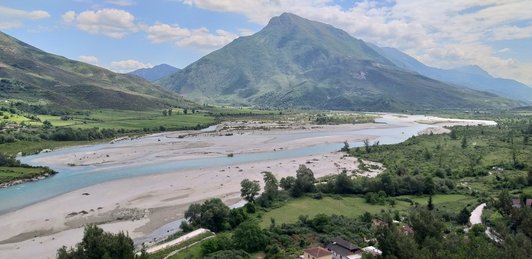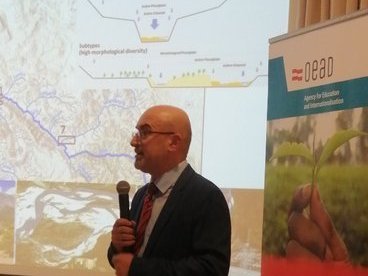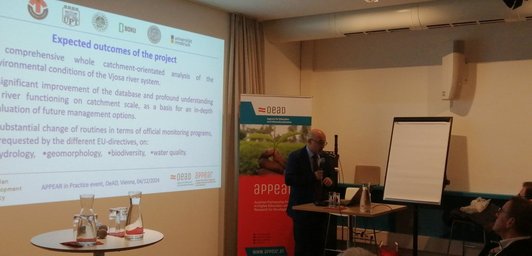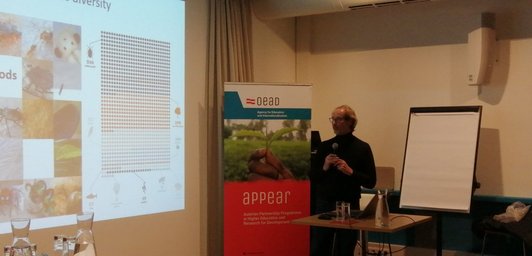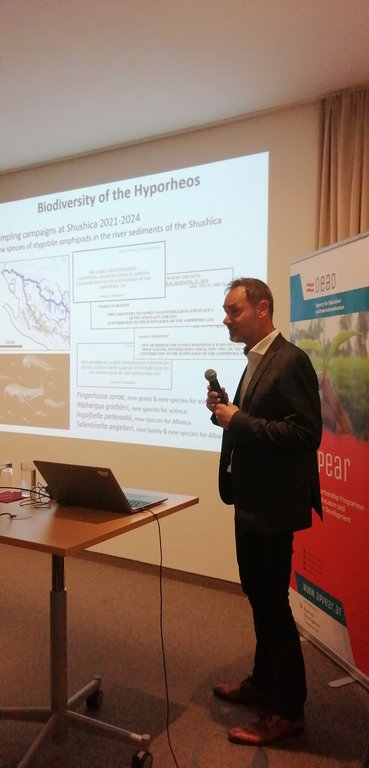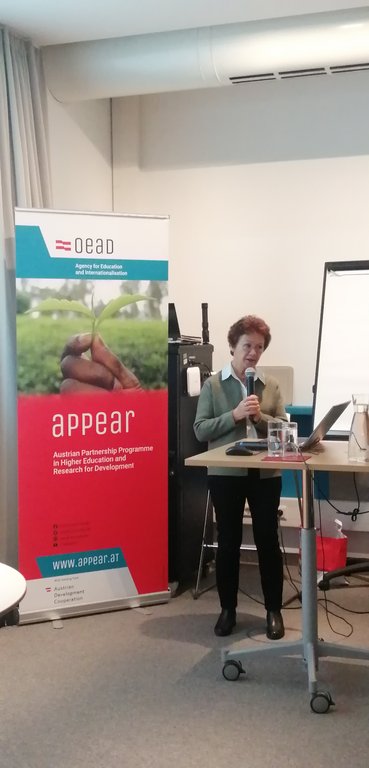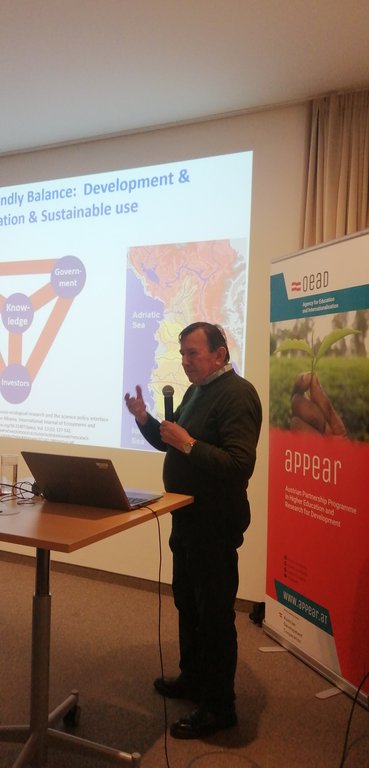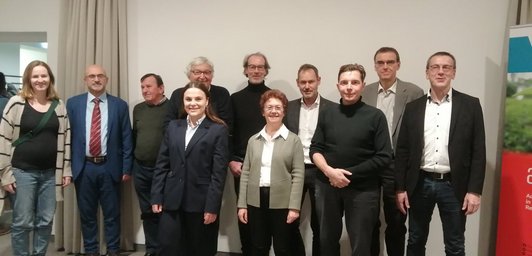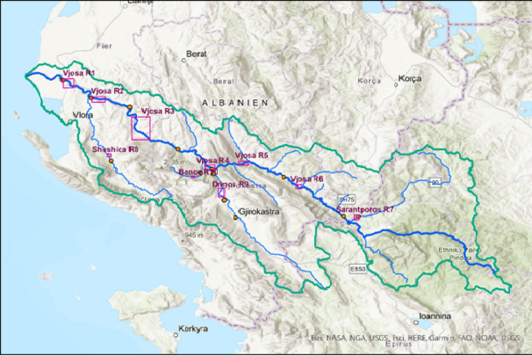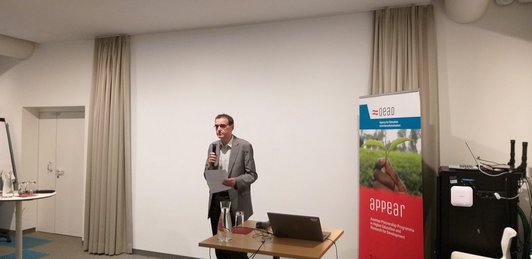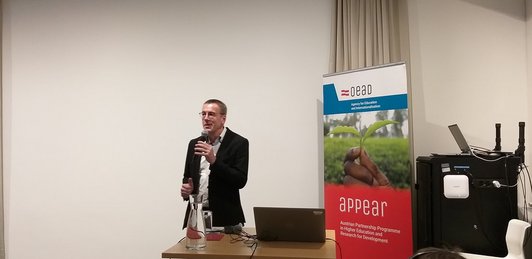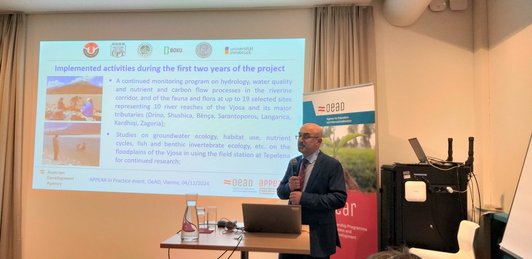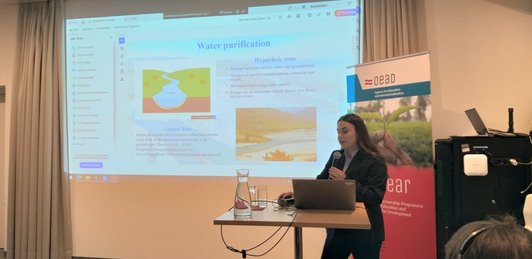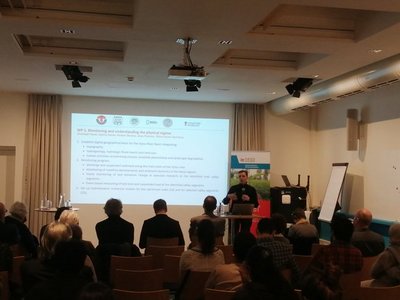

The Vjosa River in Albania, renowned as one of Europe's last wild rivers, achieved the status of a national park in 2023, marking it as the first national park of a wild river in Europe. This milestone was the result of collaborative efforts involving the Albanian Government, local and international experts, researchers and environmental organizations. On 4 December 2024 the core team of the APPEAR project VjoSusDev Project: “Environmental assessment of the Vjosa riverscape as the basis for an integrated water management and sustainable catchment development” visited the OeAD to provide a comprehensive presentation of their research activities. The event was moderated by Stella Asiimwe (Weltmuseum Wien)
After the opening remarks by Walter Ehmeir (Austrian Development Agency) and Gerhard Volz (OeAD), the project coordinator from University of Tirana, Sajmir Beqiraj, provided a brief introduction and the key objectives of the project which aims for a comprehensive, cooperative, interdisciplinary and long-term study of the Vjosa river system in Albania, as the basis for evaluating management options in view of a sustainable development of the riverine landscape and its human use. The project includes monitoring hydrology, geomorphology, biodiversity, and water quality. It aims to influence official monitoring routines and improve decision-making for water governance. The work packages and research topics include:
1. Monitoring and understanding the fundamental physical regime governing the Vjosa riverscape
2. Maintaining the Vjosa riverscape's ability to support biodiversity
3. Ecosystem dimensions behind clean water provisioning, a key fluvial ecosystem service
4. Science and Society interactions for sustainabledevelopment
Activities in the first two years have involved joint field missions, studies on groundwater ecology, and stakeholder engagement workshops.
The second presentation by Christoph Hauer (BOKU) focused on work package 1, the monitoring and understanding the physical regime of the Vjosa river. It emphasized monitoring of sediment dynamics, hydrological events, and erosion impacts to understand the river's physical regime. Geological and sedimentary analyses were conducted to trace historical landscape changes, offering insights into the river's evolution over time. Hydrodynamic modeling and field measurements were used to map and characterize the river's structure and processes, highlighting the interaction between natural phenomena and human activities. The collaborative Albanian Austrian research sheds light on the geohydromorphological phenomenons shaping current conditions.
Wolfram Graf (BOKU) in his presentation emphasized the importance of the Vjosa as a relatively undisturbed riverine system. His studies focused on biodiversity, including new species discoveries, habitat-species relationships, and the role of physical processes in shaping ecological patterns.
The research led by Roza Allabashi (BOKU) and colleagues, evaluated the river's water quality using a combination of physicochemical, microbiological, and statistical tools. Results from 3.340 measurements at multiple locations along the river indicate good water quality, but significant pollution from untreated wastewater, urban runoff, and agricultural activities affecting in particular the tributaries of Vjosa. The researchers recommend constructing wastewater treatment plants and implementing better waste management practices to protect the Vjosa and its tributaries.
The research presented by PhD student and APPEAR scholar Sonja Hoxha explored the self-purification capacity of the Vjosa River, focusing on carbon and nutrient transformations. Initial experiments showed significant degradation of dissolved organic carbon. Sampling campaigns assessed water flow dynamics, microbial communities, and pollution sources, highlighting the importance of river morphology, sediment heterogeneity, and seasonal temperature variations on purification processes.
Aleko Miho (University of Tirana) and Fritz Schiemer (University of Vienna) in their conclusion highlighted again the importance of the Vjosa River, one of Europe’s last free-flowing rivers, as a vital ecological hotspot and a model for sustainable management. Research highlights the river’s geomorphological complexity, sediment transport dynamics, and its role in maintaining biodiversity through natural processes like flooding. Studies also reveal water quality challenges linked to untreated urban and industrial wastewater, necessitating improvements in wastewater treatment and solid waste management systems.
However, the river faces significant threats, including urban and agricultural pollution, erosion, habitat degradation, and pressures from hydropower projects and unregulated tourism development. Efforts to conserve the Vjosa include its designation as a Wild River National Park, emphasizing the importance of balancing ecological preservation with sustainable development. Collaborative initiatives between researchers, government bodies, and international organizations focus on integrating scientific evidence into policy-making. These initiatives aim to implement the EU Water Framework Directive, manage critical areas, and promote sustainable tourism and agriculture. The Vjosa serves as a global example of integrated river basin management, demonstrating the importance of science-policy cooperation to address environmental challenges.
Following the presentations questions were discussed concerning the integration of local stakeholders into the research and the sustainable development perspectives given the current challenges in Albania as presented by Aleko Miho in his presentation.
To round off the event, the visitors exchanged views over a buffet and drinks

